#Mlle. Lanoire
Text



I know my blog is made for Les Mis Contents but I should upload this today.
Find out why I made this post with these three characters.
#Les miserables#les mis#My Post#Cosette#Amanda Seyfried#The Lark#Mlle. Lanoire#Karen Smith#Mean Girls#Winry Rockbell#Full Metal Alchemist#2 by 2 they have something in common.#In short. Cosette and Karen and Cosette and Winry.#October 3rd#Happy October 3rd!#2012 film#Mean Girls Day#National Mean Girls Day#I Memed a Meme#Meme
75 notes
·
View notes
Text
I believe that Cosette is one of the strongest characters in Les Mis
And when I say a strong character, I don't mean just physically. I meant emotionally and mentally as well.
Like Cosette been through A LOT. She was horribly abused as a child, grew up in turbulent times in French history, is born from the slums yet is lucky enough to be adopted into bourgeoisie by Valjean, and she got PTSD from the June Rebellion and all. A number of abuse survivors became more cynical, bitter, and/or even violent.
BUT SHE ISNT.
Even after all the shit she endured, even after all the horrors she has seen, she not only remains hopeful and compassionate, yet also offers the Light she has to a number of people around her. She literally is a reason why a number of characters found hope to keep going. Without her, ALL of her loved ones would have gone off to the deep end already.
Cosette does not allow herself to be submerged in misery and despair. Even in dark times, she TRIES to maintain as hopeful as possible and offers compassion and solace to a number of others. She is LITERALLY a reason why Valjean stopped being tempted back to criminal life, why Fantine still has hope despite her hardships and the fact she gave EVERYTHING for Cosette to have a better life, why Marius found hope again after he thought he lost EVERYTHING, and why the Thenardier sibs found hope to turn their lives around.
Cosette isn't just a representation of hope. She is also a representation of :
- A world beyond a barricade
- A light people fighting are climbing to
- A reminder of goodness in the world
- Victory of hope over despair
Cosette is actually tough as nails, yet she CHOSE to remain compassionate and hopeful despite all she experienced and has TREMENDOUS emotional and mental strength
And I think that's beautiful.
#STOP SAYING SHE IS FLAT AND BORING#look at what she experienced#AND HOW SHE REMAINED A WALKING BALL OF SUNSHINE BECAUSE OF IT#i love cosette#les mis#defend cosette#the lark#mlle. lanoire#les miserables#she literally helped nurse marius back to health AND EVEN INSPIRED MARIUS TO HAVE HOPE TO KEEP GOING WHEN HE THOUGHT ALL WAS LOST#she LITERALLY IS A REASON WHY MARIUS IS INSPIRED TO FINISH WHERE THE LES ABCS LEFT OFF#AND ALSO WHY THE LES ABCS ARE REMINDED THAT THERE IS MORE TO LIFE THAN THE BARRICADES#she's silk hiding steel#femininity dont mean weakness#it never does#SHE FORGIVEN EPONINE AND AZELMA LONG AGO AND EVEN SHOWED THEM AND GAVROCHE UNEXPECTED COMPASSION#and that is a HUGE push for them to turn their lives around#COSETTE IS AN IMPORTANT AF CHARACTER#sorry I meant WALKING BALL OF SUNSHINE IN SPITE OF IT
50 notes
·
View notes
Text

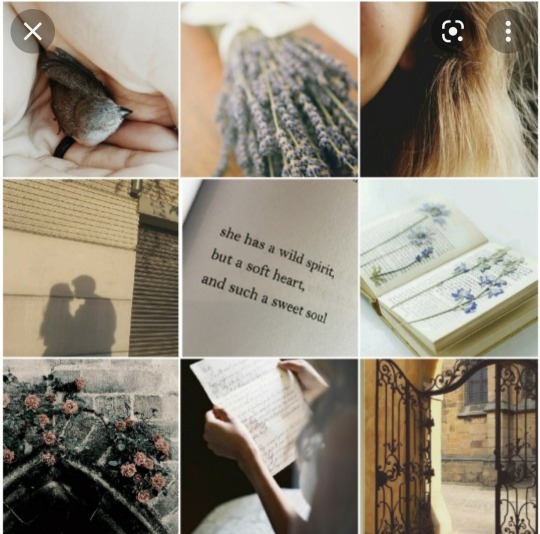


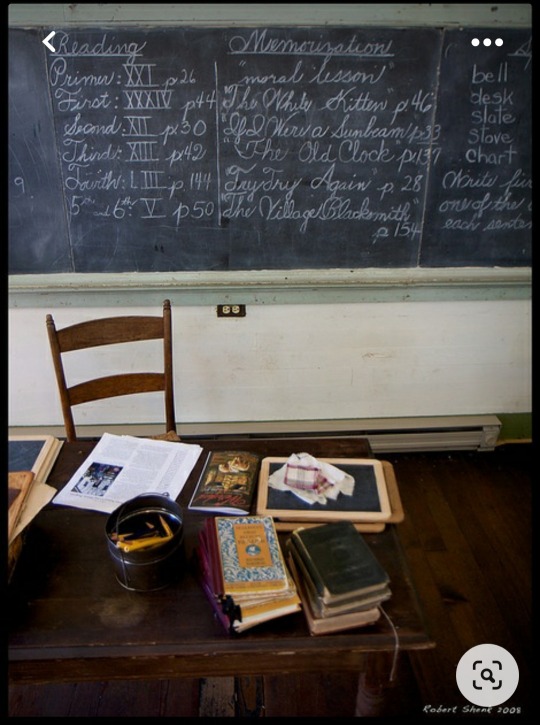

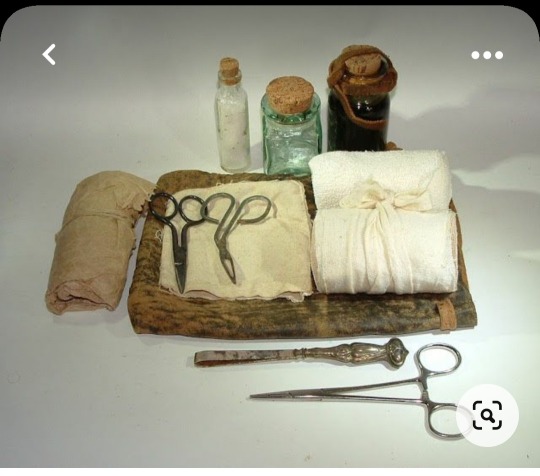



Cosette Trebuchet Aesthetic
🤩🤩🤯🤯🤯🥺🥺🤯🤯🤯🤯
0 notes
Text
Marius is absolutely insufferable here, with how he's rude to the eldest Jondrette daughter just because he's angry that the francs he gave her could have been used by him to follow Mlle Lanoire. She, however, is very kind to him. It's sad to see how uncertain she is when checking in on him, as if this sort of emotional support is foreign to her (after all, if she's never received it, how is she supposed to know how to provide it?). Marius' use of "tu" instead of "vous" (represented by his switch to "thou" because there's no modern English equivalent) is likely meant as a continuation of his rudeness, but she interprets it as familiarity and is delighted, which also hurts to read. To her, Marius is bordering on a friend. He's kind to her (he gave her food), he's respectful (he didn't demand anything of her the first time she went to his room and even gave her back the letters), and now he's sharing his hardships with her to some extent. To Marius, though, she's only been an object of pity (when she first came) or a tool (this time). It's understandable that Marius would mean more to her than she does to him - they barely know each other, but Marius' kindness is much rarer for her than hers is for him - but it's still sad to see that contrast, especially when Marius is now being self-serving rather than simply distant.
The emphasis on "the beautiful lady" is meant to demonstrate that Mlle Jondrette is upset by this request, but it's intriguing to think about how Mlle Lanoire's beauty has been defined in relation to the Jondrettes. She's not described as "naturally" beautiful around them, but as beautiful because of her clothes and demeanor. Since she has money, she can afford clothes that are fashionable and that fit her. She can be benevolent as well, helping those less fortunate than her because there are many people less fortunate than she is. Her "feminine"-coded behaviors (taking care of the child, being modest, etc) are possible because of her money, too; her expenses are covered by her father, so she can adhere to the expectations of her gender in a way that a working-class woman (who'd have to avoid some or all of these expectations to work) could not. Both of the Jondrette daughters envy that, especially the elder one. She, like Mlle Lanoire, is between childhood and adulthood, but she has no chance to experiment with womanhood (or to enjoy her childhood) because of her poverty. Her child-like aspects (her boldness) are disorienting in someone who has been aged by suffering rather than just signs of her youth, and her experiences with the expectations of womanhood haven't been positive, either. Although gendered expectations aren't great in general, the Jondrettes' frustration stems from their lack of choice with regard to them.
53 notes
·
View notes
Text

mlle. lanoire / ursule / cosette fauchelevent
325 notes
·
View notes
Text
Impressed solely with the child’s gown and the old man’s hair, [Courfeyrac] had dubbed the daughter Mademoiselle Lanoire, and the father, Monsieur Leblanc, so that as no one knew them under any other title, this nickname became a law in the default of any other name. — les mis, 3.6.1
Cosette returns!! This time with a pseudonym of her own to match her father's penchant for collecting them. I adore the name Mlle. Lanoire and love the contrast she sets against Valjean dubbed as Leblanc (which is what drew Courf in in the first place anyways). I wish contemporary adaptations of Cosette acknowledged her dark appearances more often; I really loved the early renditions of Musical!Cosette black dresses w the lace, but nowadays it's just a lot of greens and blues (coupled with blonde!Cosettes too 🥲)
43 notes
·
View notes
Text

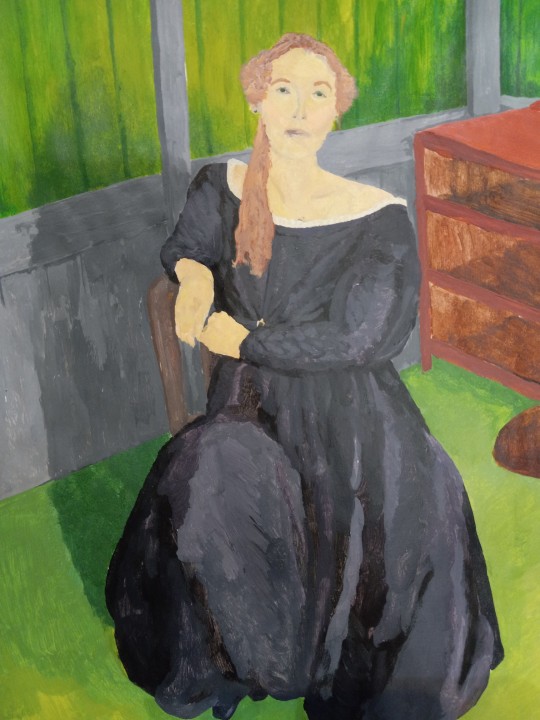
Mlle Lanoire
#this is the second painting I've done of cosette that I imagine Marius could have done#jad's art <333#acrylic paint#cosette fauchelevent#les mis#green room painting
19 notes
·
View notes
Text

2021 has ended, it's time for the 10 best drawings of the year ! .... Except that they are 13 because I really, really, really could not decide. It's too hard ! *whines" So here are the finalist :
- Stars in your multitude aka Joly and Bossuet's date night
- Feuilly and Enjolras having another date night
- Local Fair Trade Coffee Shops have the best baristas aka collab with MagicalMauR for the Banguette
- Gardening needs passion, but be careful, maybe ?
- Ceri and Arthis having a date night TOO for @paon-de-jour (OMG ! OCs !)
- Do you hear the chicken cluck ? aka Chickenjolras is a Thing that Exists
- Lalli has long hair, shiny boots and therefore I love him
- When hot outside, draw some cold art. Also I want that rug.
- A Pile of Dorks (and Montparnasse) for Barricade Day
- Do you like the color of the scarf ? aka the Dorks are Back in Town with Bubble Tea (more OCs !)
- Jiang Cheng is the best pillow
- Mr Leblanc and Mlle Lanoire going for a stroll
- Christmas Time at Javert-Valjean-Fauchelevent-Leblanc-Lanoire household
[image ID] a mosaic of 13 drawings in four rows. Each picture's own description can be found under each link. End ID]
#les miserables#mo dao zu shi#stand still stay silent#and OCs !#look#I drew OCs this year !#my Drawings
15 notes
·
View notes
Text
Cosette’s Timeline
Born in Paris in the spring of 1816, probably around mid-March. (1.4.1, calculations here)
Age ~15 months: Her father abandons her mother (early summer 1817, 1.3.3)
Age 2: Her mother leaves Cosette with the Thénardiers (~April 1818, 1.4.1). Cosette goes immediately from wearing fine clothes made by her mother to wearing rags.
Age 4-5: The Thénardiers keep Cosette inadequately dressed for the cold, and start treating her as a servant when her mother falls behind on payments (winter 1820, 1.4.3/1.5.10)
During her time at the inn (age 2-almost 8), Cosette befriends the Thénardier’s dog. She is regularly beaten by Mme Thénardier. Cosette sleeps under the stairs in the kitchen, wears rags, and is fed scraps. Her work includes dusting, washing, sweeping, fetching and carrying, buying food, watering guests’ horses, getting water when the water-carrier is off work (ie, at night), and knitting. Her only toy is a lead sword and some rags. [2.3.2-2.3.8]
Age 7: Her mother dies shortly after Cosette’s 7th birthday (after March 25, 1823; 1.8.2, 1.8.4, 2.4.2). Cosette learns this 9 months later, on Christmas Eve. That same night, a stranger carries her water bucket from the woods for her, gets her a night off work, and gives her a beautiful doll. The next day, she finds a gold coin in her shoe, and her new adoptive father gives her new clothes and takes her away to Paris (2.3.7-2.3.11).
Age 8: Living in Paris, Cosette plays. Her father takes her for walks, and teaches her to read. Around the time of her 8th birthday (March 1824), they flee the apartment where they’ve been living and enter the Petit Picpus Convent. (2.5.10)
Age 8-13: Cosette attends the convent boarding school as a charity student. She visits her father and ‘uncle’ for an hour each day. In addition to religion, the curriculum includes music, history, housekeeping, and possibly drawing (2.6.4, 2.6.7, 2.8.9).
Age 13: Cosette and her father leave the convent (between April and Ocotober 1829), following the death of her uncle. That autumn, they move into a House on the Rue Plumet, and take on a servant, Toussaint. (4.3.1, 4.3.4)
Age 14: Cosette and her father take walks in the Luxembourg Garden, and are nicknamed “M Leblanc” and “Mlle Lanoire” by the students. (3.6.1) Cosette cajoles her father into having white bread and a fire in his rooms by insisting that she share his deprivations. (4.3.4).
Age 15: Cosette becomes/discovers she is pretty, and gets interested in fashion, and in a dreamy student she sees in the Luxembourg (4.3.5-7). In October 1831, Cosette and her father encounter the chain gang near the Barriere du Main. (4.3.8) On February 3, 1832, some 6 weeks before her 16th birthday, Cosette and her father take clothes to a poor family in the Gorbeau Tenement; returning to pay their rent, her father is wounded and develops a fever. Cosette nurses him for a month until he recovers. (4.4.1)
Age 16: Cosette has a crush on a handsome lieutenant (Théodule Gillenormand) for about a week in April 1832. This ends when she receives Marius’s love manifesto in the third week of April (4.5.1-4.5.3, 4.5.6). Cosette and Marius continue to meet in the garden each evening from the end of April until early June. (4.8.2) On June 3, Cosette tells Marius that her father plans to take her to England soon, and he headbutts a tree for two hours while she cries. Marius leaves her his address and they agree to meet again on the 5th (4.8.6). Cosette’s father decides to move residences late on the 4th, and Cosette writes to Marius with her updated address, giving the note to a disguised Éponine (4.9.1, 4.12.7). JVJ, Cosette, and Toussaint remove to the apartment on the Rue de l’Homme Armé that evening. (4.12.7) Cosette stays in her room all day on June 5th, and eats no dinner, claiming to have a headache (4.15.1). She wakes at dawn on the 6th, hoping/expecting to hear from Marius (5.1.10). As his note was intercepted by Cosette’s father, it’s unclear when and how she found out about Marius’s injury and removal to the Gillenormand household, but over the summer she sends lint and bandages and inquires after his health. Between September and December, Cosette begins visiting Marius and they become engaged. She also finds out that she has a substantial fortune (5.5.2, 5.5.4, 5.5.6)
Age 17: Cosette marries Marius on February 16, 1833, a few weeks before her 17th birthday. (5.6.2) She and Toussaint move into the Gillenormand house, but her father resists joining them. He visits daily from February 18th to late April, but begins treating Cosette more formally and staying for less time, while she tries to make him comfortable with chairs and a lit fire. (5.7.1, 5.8.1-2) He stops coming to see her in May (5.9.1-2). In early June, Marius discovers that Cosette’s father saved him the previous summer, and the two rush to her father’s deathbed. (5.9.5)
#saving for future reference#Cosette Week#For A Lark#lark rising#applying the forbidden magic of math#Les Miserables
142 notes
·
View notes
Text



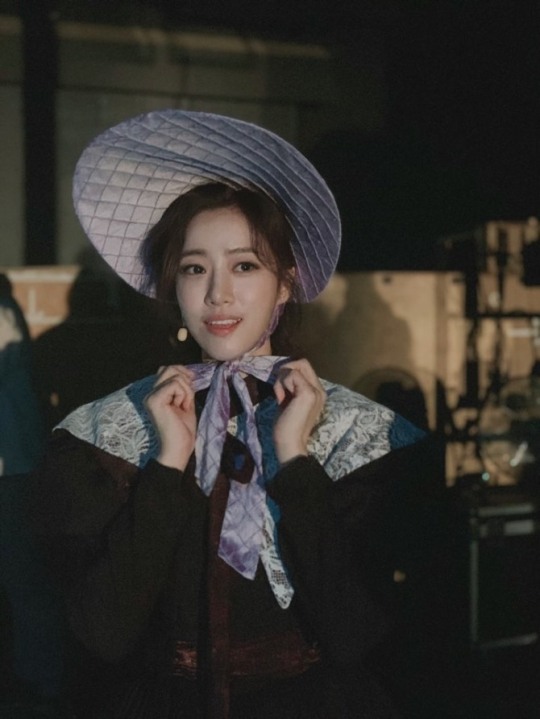
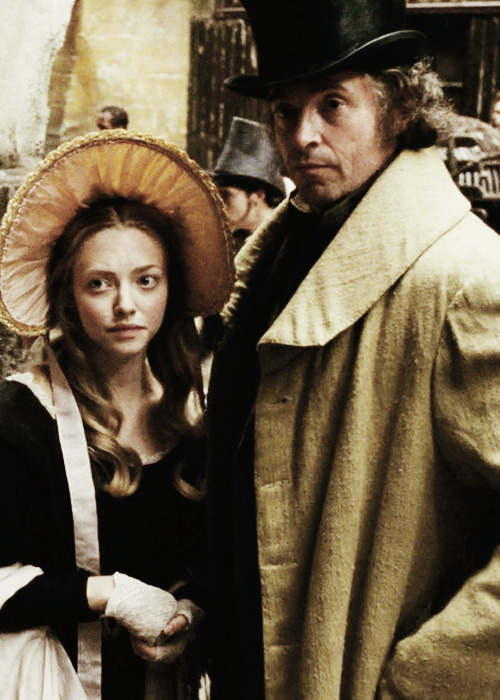
For the Mademoiselle Lanoire, still prefers Black even after she's into finding out new and fancy clothings.
Source from here, here, here, and here.
#Les miserables#les mis#My Post#Scrapping around the Web#Cosette#The Lark#Mlle. Lanoire#Jean Valjean#M. Leblanc#Father and daughter#Owl and Wren#At Jardin du Luxembourg#The Robbery#Cosette in her Puberty#The Lady of Black#It's really because she wore black so much since her childhood?#The Brick#Illustration#Musical#2012 film#Costume#Fashion#Les Mis Letters
68 notes
·
View notes
Text
Some people seem to forget that Cosette is a goth, like :
. Traumatic backstory ( with her 2 horrid years at Thenardier Inn )
. Lives in a convent for 9 years as a student ( the Petit Picpus Convent actually looks kinda like a gothic boarding school/church hybrid in dark academia genre btw )
. Black dresses, floral accessories, her Catholic Shawl and her rosary are her iconic style pieces
. Loves reading, writing AND making artworks of gothic related stuff
. Seems to think she can sense spirits floating around her at times
. Candles, a Catholic Cross and Lacy curtains in her room in Valjean and Cosette's house in Rue Plumet ( post Convent era and during 1830s French Rebellion era )
. Likes to sneak out to the house garden and even the Rue Plumet public gardens at times in the 1830s French Rebellion Era
. Tries her best to find the bright side in dark situations and things
🤯🤯🤯🥺🥺🥺🤯🤯🤯🤯
76 notes
·
View notes
Text
Les Misérables: The Not-Scanlation, 3.3.1 (for real this time)
Previously on Les Mis Manga: Marius is the most Pontmercy to ever Pontmercy. Also I let Google Translate handle this in a previous April Fool’s post. Is it better than it used to be at this? Yes. Is it actually good at it yet? No.
Coming up: Pontmercying continues, this time with a bonus handkerchief.
With Covid-19 wreaking its terrible way through the globe and the governor’s “stay at home” order, I have an abundance of time on my hands and nearly a year’s worth of residual guilt over how I haven’t been working on the Les Mis manga translation. So I’m picking it up again! For real this time! I promise this is not done by Google Translate.
As always, beneath the cut are scans, followed by the script in my best attempt at translating (I continue to not be a pro at this, and corrections are always, always welcome). Translations up through this point as well as of the entirety of the barricade, can be found at my [manga masterpost]. Overviews of all the chapters I haven’t translated yet can be found there, too, up until the very final chapter.
I highly recommend buying the actual manga from any of the links [here]. The art truly is more amazing in person, and by buying either the Japanese original or official French translation, you’ll be supporting the artists! Note that Kinokuniya USA is, for the time being, only taking orders via email or phone since their online store is being updated and, of course, due to Covid-19, their physical stores are mostly closed.
Preview is scandalous:
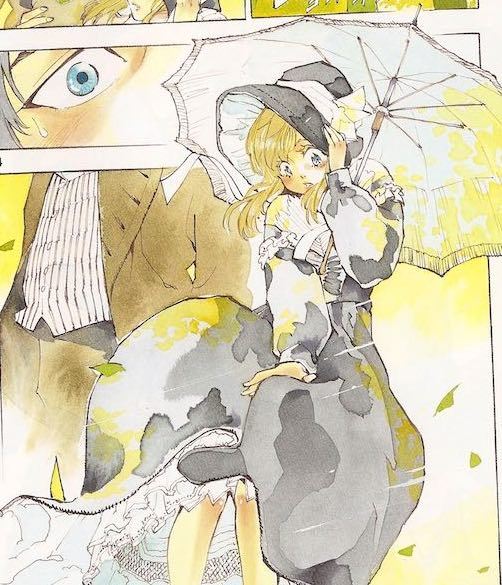
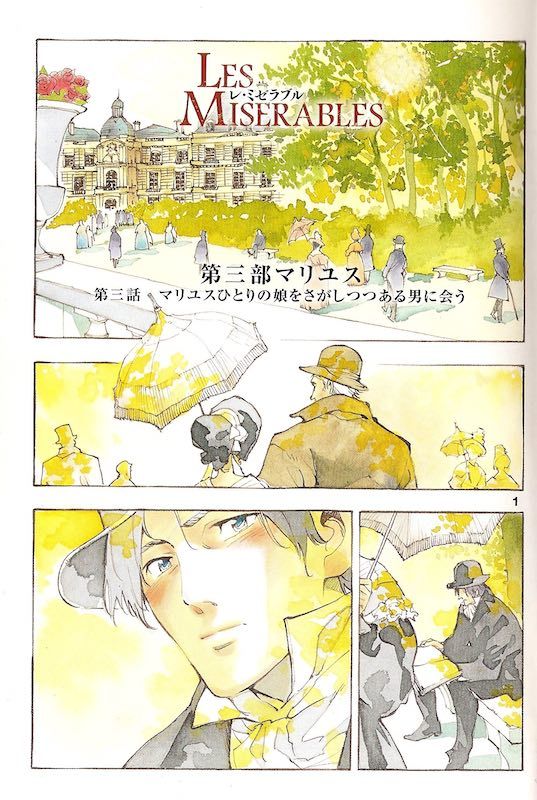
Title:
Book 3: Marius
Chapter 3: Marius Alone, Searching for a Girl, Meets a Man
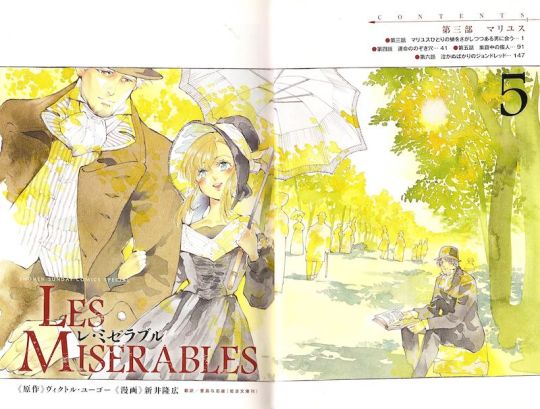
(all the Japanese text on these pages are the author credits and this volume’s table of contents)
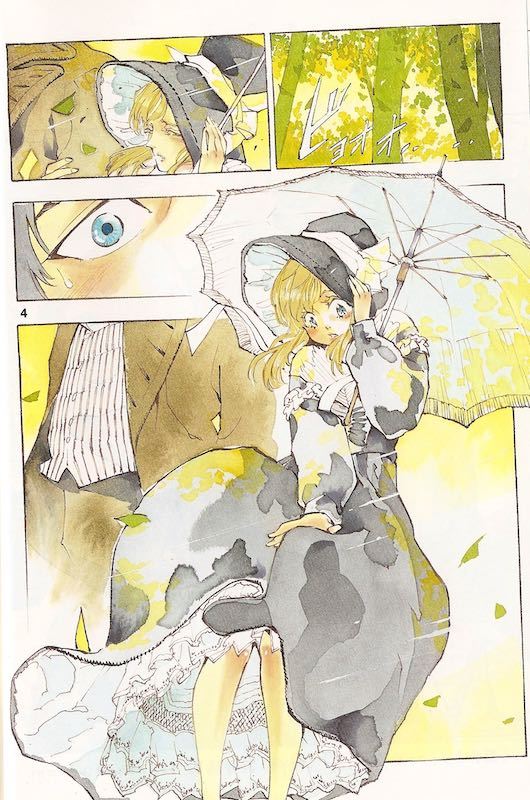
SFX:
*whoosh*
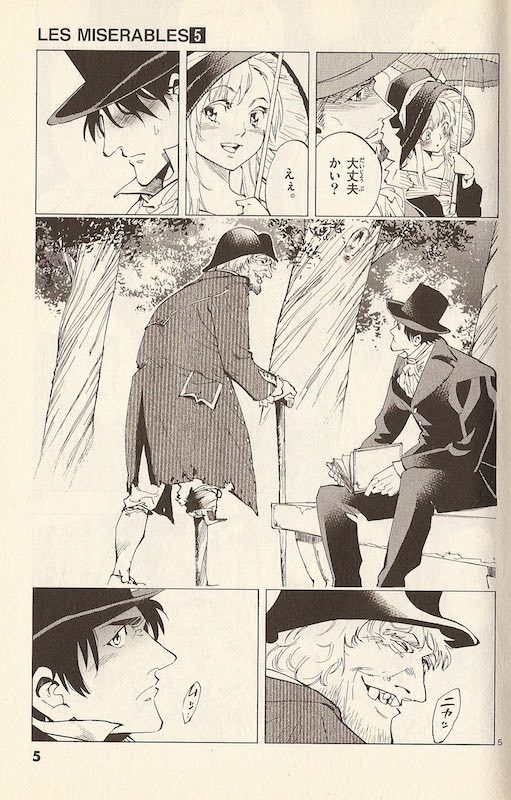
Jean Valjean:
Are you all right?
Cosette:
Yes.
Old Soldier:
*grin*
Marius Pontmercy:
Hmph.
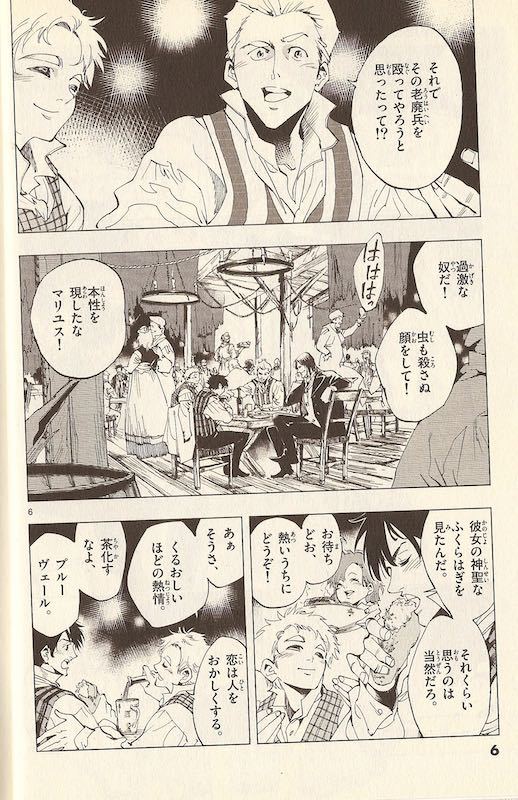
Courfeyrac:
So then, you thought about beating up that old soldier?!
What a radical*! And with such an innocent face!
Guy standing on the table:
Hahaha!
Courfeyrac:
Marius, your true character is revealed!
Marius:
He was looking at her sacred legs. So that sprang to mind.
Waitress:
Sorry for the wait. Careful, it’s hot!
Jean Prouvaire:
Ah, yes, the madness of passion.**
Love makes a person act strangely.
Marius:
Don’t make fun of me, Prouvaire.
*The word Courfeyrac uses, 過激, is for political radicals. He’s ribbing Marius not only about his ridiculous crush, but also his politics.
**Prouvaire’s remark is probably inspired by the waitress saying the food is hot, or 熱い. The word he uses for passion, 熱情, is made of the kanji for “hot” and “emotion.”
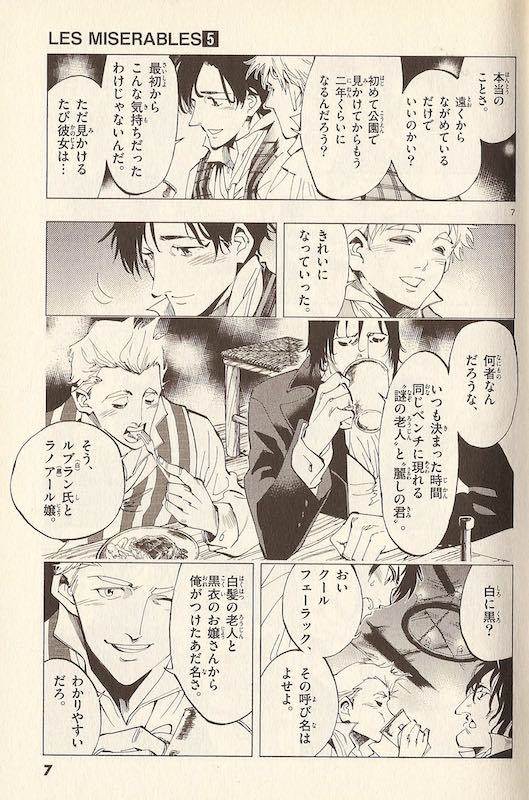
Prouvaire:
It’s true, though. Do you just have to look upon her from a distance? It’s been about two years since you first noticed her in the park, right?
Marius:
It’s not as if I felt this way from the beginning. But as I noticed her over time…
Prouvaire:
…she became beautiful.
Grantaire:
What kind of people are they, always appearing on the same bench at the same time, this “mysterious old man” and the “beautiful girl”?
Courfeyrac:
Right, M. Leblanc and Mlle. Lanoire.
Grantaire:
White and black?
Marius:
Hey, Courfeyrac, knock it off with those nicknames.
Courfeyrac:
I use those nicknames for a white-haired old man and a black-clothed young lady.
It’s easy enough to understand.
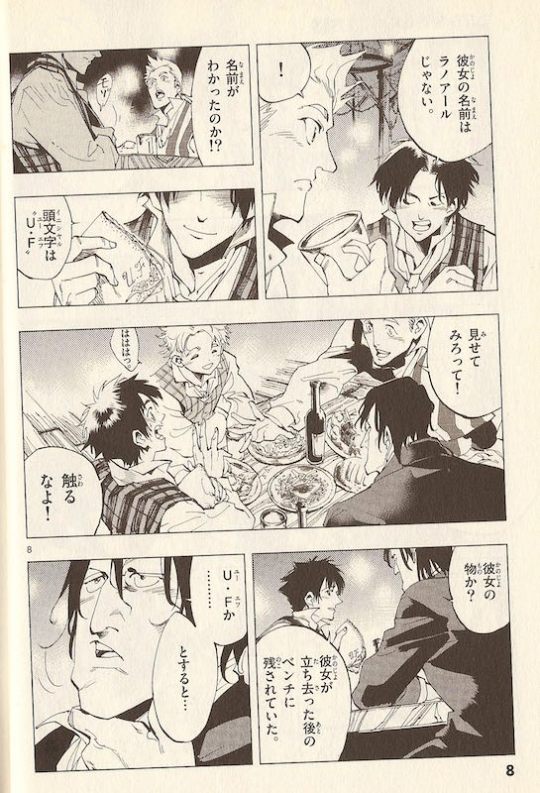
Marius:
Her name is not Lanoire.
Courfeyrac:
!
Do you know her name?!
SFX:
*rustle*
Marius:
Her initials are “U.F.”
Courfeyrac:
Lemme see!
Prouvaire:
Hahaha.
Marius:
Don’t touch it!
Grantaire:
It’s hers?
Marius:
It was left behind on the bench after she’d gone.
Grantaire:
U.F? ……going by that…
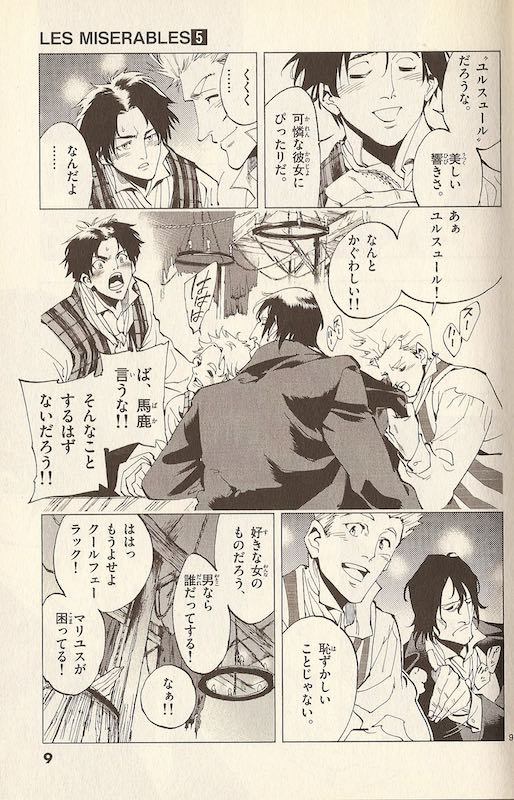
Marius:
I’ll bet it’s “Ursule.” It sounds so beautiful.
Perfect for a sweet girl.
Courfeyrac:
*snicker*
Marius:
What?
Courfeyrac:
Ah, Ursule! How sweet-smelling!
*sniff*
*sniff*
Prouvaire:
Hahaha
Marius:
D-don’t say such dumb things!! You shouldn’t do that!!
SFX:
*patpat*
Courfeyrac:
I didn’t mean to embarrass you.
I’d do it to any guy who’s probably in love with a lady.
Marius:
What?!
Prouvaire?:
Haha, lay off already, Courfeyrac! Marius is embarrassed!
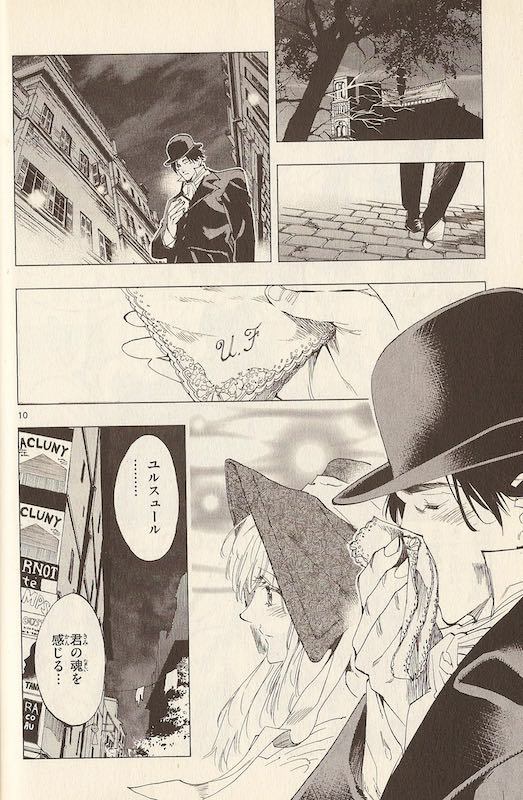
Marius:
Ursule……
I feel your soul…
Next time on Les Mis Manga: Marius continues to Pontmercy and I almost die of second-hand embarrassment for him.
#les miserables#les mis manga#attempts at translation#marius pontmercy#cosette#courfeyrac#jean prouvaire#grantaire
21 notes
·
View notes
Text
Poor Marius. In addition to thinking that the sparrows are mocking him, he now thinks that "M Leblanc" is angry with him and that "Mlle Lanoire" is judging his dusty shoes. We have no insight into what these characters are thinking at the moment, but Marius' insecurities lead him to assume that they're displeased with him.
But he's also so happy that he's spending time with a friend! He sees Courfeyrac two days in a row! And he meets with Courfeyrac's friends, too, as Jean Prouvaire is there and he embraces someone from the provinces. It's probably disorienting for Courfeyrac (his normally withdrawn friend is now inviting him out, extending the outing, and then being super friendly to strangers the next day), but it's good that Marius is interacting with others.
Another brief political reference:
At dessert, he said to Courfeyrac. “Have you read the paper? What a fine discourse Audry de Puyraveau delivered!”"
Audry de Puyraveau was a central figure in the July Revolution and a left-wing politician. Marius, then, is being much more politically expressive than he has been in a while, combining his "sympathies" for the less fortunate with praise of someone who is actually involved in politics.
I'm not a fan of how love and attraction are discussed here (not just Courfeyrac and his "collection," but also the trap metaphor), but I do think it's kind of funny how dramatic it is? "It was all over with him" is a very over-the-top way of acknowledging that Marius is in love.
27 notes
·
View notes
Text
Brickclub 3.5.2-3.6.3
3.5.2 - 21/04/20
Another Budget Chapter™. I actually find these... relaxing?
Marius is still poor, but less poor than he was in the last chapter, and has moved from Courfeyrac’s rooms to his own in the Gorbeau house.
Hugo gives us Marius’ thoughts on debts, both relating to the monetary kind and the Saving Your Father kind.
3.5.3 - 22/04/20
The way Marius’ poverty is treated is off-putting in the context of the rest of the book. Most of the characters we spend a lot of time with are poor for at least some of their life, if not all of it, and Marius is no exception. However, with every other character*, we are seen how harmful and difficult to escape poverty is: JVJ spends years of his life in prison because he had to steal to feed his family. Fantine fights to sustain herself so she can support her child, and it ultimately leads to her death. The Patron-Minette is full of characters who mirror others in the book who have had a more wealthy life than them. It practically shoves in your face that they may have become better people if they had been wealthy and had the opportunities the characters they mimic had.
But with Marius it’s supposed to make him a more well-rounded person? Teach him not to take things for granted? Give him a work ethic? It doesn’t feel genuine. Hugo spends the whole book drilling in how destructive poverty is on an emotional and familial level, as well as to society as a whole, and then sort of... throws it away with how he treats Marius’ lack of money. It definitely weakens the point he’s been making the whole time.
*excluding Bishop Myriel, but the relative poverty he lives in is voluntary, and if he decided he didn’t want to be poor anymore he could just... do it.
3.5.4 - 23/04/20
We meet Mabeuf!!!
3.5.5 - 24/04/20
Marius’ life seems to have settled down, so now he spends most of his time wandering through Paris and making other people nervous. He’s doing better financially now, and pays his neighbor's (the “Jondrette’s”) rent, just because he thinks it’s the nice thing to do.
3.5.6 - 25/04/20
Théodule visits M. Gillenormand, who complains about republicanism and The Youth™, as usual.
3.6.1 - 26/04/2020
Hugo describes Marius’ appearance to us, most notably his “well-opened and passionate nostrils”. Marius unaware that he is Sexy, I guess, because girls in the street turn to stare at him, and he thinks it’s because of his old clothes. Courfeyrac calls him “Monsieur l’Abbé” because he doesn’t seem to be interested in any of the girls who clearly are interested in him. This is also the first time we hear of Marius seeing Cosette and Not-JVJ ( or M Leblanc and Mlle Lanoire.)
Cosette is described as a little girl in this chapter, and then is weirdly sexualised in the next chapter, so that’s... fun.
3.6.2 - 27/04/2020
It has been 6 months since the last chapter, and in that time Cosette has supposedly grown from a little girl into a young woman. I’m not exactly sure how old Cosette is supposed to be right now (last chapter said 13 or 14, but I’m not sure if that’s her actual age or just how she appears), so the weird focus on her beauty and how she looks So Much Older Now rubs me the wrong way. Especially considering the fact that she retains her childlike eyes. Ew?
3.6.3 - 28/04/2020
Cosette now has woman’s eyes, I guess.
Marius starts wearing his special occasion clothes to the garden, because he is now in love with Cosette and wants to be presentable.
7 notes
·
View notes
Text
Brickclub: 3.6.1
A new book, and so a chapter full of description. We finally get a better look at Marius’ body, after having spent so long in his mind, and it turns out that, surprise surprise, Marius is hot. Who didn’t see that one coming?
But seriously, in a book where beauty is not just correlated to virtue but also to, like, inherent goodness of spirit, the fact that Marius is attractive does matter. Again, Marius is, at his core, a good person who wants to do good in the world.
But most of this chapter is Marius And Also Girls. We learn, unsurprisingly, that Marius doesn’t Girls, not even a little bit. In fact, the only two girls that he doesn’t flee from are an old woman and a child. True to his Marius-ness, he doesn’t flee from them because he doesn’t notice them, and he doesn’t notice them because he doesn’t feel either threatened by or respectful of them. They’re just set dressing. Marius is very much the protagonist of his own life, and his life is definitely a weird, philosophical piece of lit fic where basically no other characters get any page time and the ones that do exist to further the protagonist’s moral and spiritual journey.
So we skip lightly over the old woman and instead focus on the child. We get two main clues as to the identities of “M Leblanc’ and ‘Mlle Lanoire,’ namely that he has a head of pure white hair and that she was raised in a convent. (Although, if she was eight when she entered and fourteen now, that... actually wasn’t all that many years that she spent in that convent. I mean, six years is not nothing, but it’s not a full childhood and adolescence either.)
It’s been a while since I wanted to fight Hugo about women, but this sentence? “Only, [her eyes] were always raised with a kind of disagreeable self-confidence." This sentence makes me want to fight him.
I hate to say it, but watching Courfeyrac deal with women does kind of make the ‘Tholomyes but good’ comparisons make sense. Like, he’s definitely not the utter awful person that Tholomyes is, but he does come from the same social background, one that does kind of see women as there for his entertainment and not much else. And, like, I don’t want to hold him to standards not of his time, but when you compare him to a lot of the other men in this story -- Marius, Valjean, Enjolras, even Myriel -- his attitude stands out. Courfeyrac isn’t the kind of guy who would pull a “surprise” like Tholomyes and his friends, but he is totally the kind of guy who would enter into that kind of quasi-transactional romantic relationship. He’d just make sure that everyone involved was getting something out of it and wanted to be there.
8 notes
·
View notes